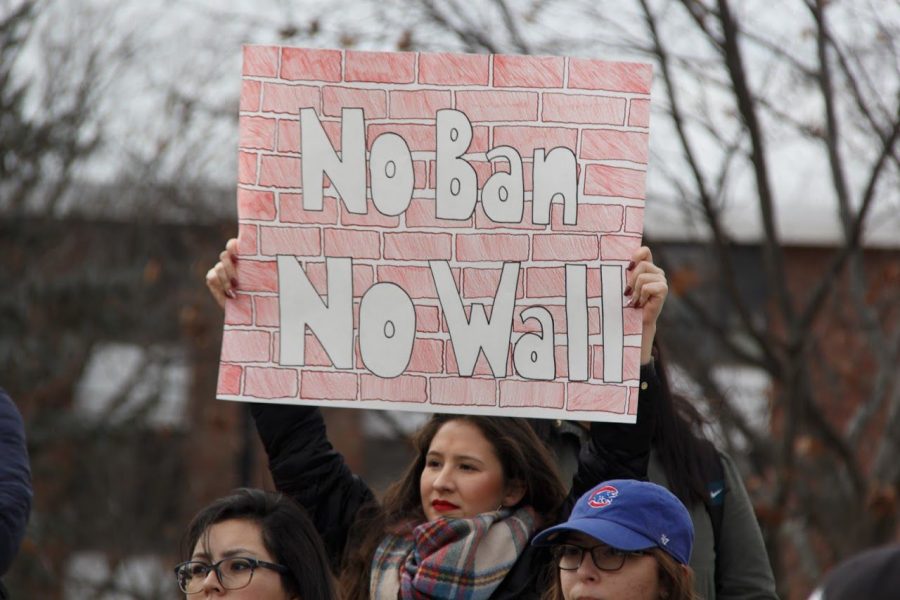Not From There: The Undocumented Series Part 3
February 20, 2017
For a DeKalb resident and mother of a 16-year-old son born in the United States, it’s not so much the recent deportations that worry her but not knowing what is to come. She wished to remain anonymous because of her undocumented status.
“If I’m deported or if I leave, he wants to stay here; but it’s going to be harder for him because he’s going to be here alone. He won’t have his family’s support,” she said. “If he was to go back to Mexico, he would be in a country he doesn’t know. Even though he’s a [U.S.] citizen, he would struggle with the language, with the school system, with everything because he’s used to this life here.”
Stuck in time between a recent national wave of deportations and a cryptic promise for further executive action targeting undocumented immigrants, NIU students and DeKalb residents face this uncertain future.
President Donald Trump guaranteed at a press conference Thursday a second immigration executive order this week that would be more in line with the decision by the federal courts to suspend his travel ban. The announcement came after a week of action by Immigration and Customs Enforcement that resulted in the arrests of more than 680 undocumented immigrants — 75 percent of whom were previously convicted of serious crimes, according to a statement by Homeland Security Secretary John Kelly.
“President Trump has been clear in affirming the critical mission of [the Department of Homeland Security] in protecting the nation and directed our department to focus on removing illegal aliens who have violated our immigration laws, with a specific focus on those who pose a threat to public safety, have been charged with criminal offenses, have committed immigration violations, or have been deported and reentered the country illegally,” Kelly said, according to the statement.
Getting left behind is also a possibility for students similar to Alejandra Vazquez, senior industrial management engineering technology major, who said she is close with many people who are undocumented. Vazquez was one of more than 60 NIU students, faculty and staff who marched Friday on campus in response to the uncertainty and in conjunction with the “Day Without Immigrants” protests.
“I feel this is a way we can voice ourselves and be heard on what we feel is right and the change that we need done to this country,” said Vazquez, who represented those close to her in the march.
Adding to the list of unknowns is the fate of the Deferred Action for Early Childhood Arrivals program, an executive order signed by former President Barack Obama in 2012 that allows certain undocumented immigrants who came to the United States as children to avoid deportation for two years. Trump praised those under the protection of DACA during Thursday’s press conference in contradiction with previous campaign promises that alluded to the law’s dismantling.
“You have some absolutely incredible kids,” Trump said during the press conference at the White House. “The DACA situation…is a very difficult thing for me because, you know, I love these kids — I have kids and grandkids — and I find it very, very hard doing what the law says exactly to do, and you know the law is rough.”
NIU and DeKalb have refused the “sanctuary” designation used by cities that do not adhere to ICE requests to hold detained undocumented immigrants who have committed non-serious crimes.
NIU spokesperson Joe King said NIU officials did not want to present a false sense of security by calling NIU a “sanctuary campus.”
“There is no legal designation for a sanctuary campus or sanctuary city or anything like that, but they’re worried that even if they adopted that title in a symbolic way, that it could get students thinking, ‘Oh, I’ve got certain protections here on campus,’” King said. “But in reality, they wouldn’t have these special protections.”
While pledging to gear up resources for undocumented students and training for faculty and staff, according to a prepared statement by NIU on Jan. 30, NIU has not made clear whether it would comply with requests from ICE officials to hold undocumented students in the event of an arrest.
Vazquez and several participants of Thursday’s march said they felt NIU is doing a good job at making the undocumented and international student population feel safe, however.
“The fact that we feel comfortable enough to do something like this on campus and not be scared to get harassed by anyone or anything, it just shows that we feel comfortable enough and that NIU does support us,” Vazquez said.
DeKalb Mayor John Rey said the city will not adopt the “sanctuary” designation because of the loss of federal funding that could occur, referring to a warning by Trump that he would deny federal money to cities that do not cooperate with ICE officials.
“At this point, that’s more of a threat than a reality, but I don’t feel it justifies DeKalb taking that risk,” Rey said.
All DeKalb mayoral candidates said they would not support the designation during a Feb. 6 forum at the DeKalb Elks Lodge, 209 S. Annie Glidden Road.







